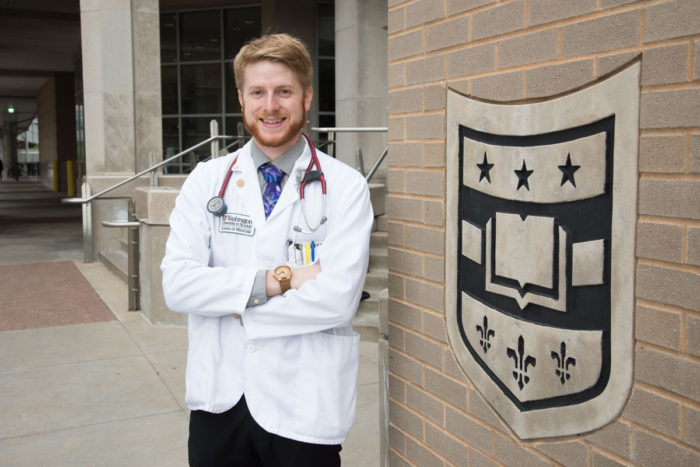Class of 2016: Brian Bouchard
Sensitive and thoughtful, soon-to-be physician wants to treat the underserved
 Robert Boston
Robert BostonBrian A. Bouchard's compassion for the underserved took shape at a missionary boarding school in Kenya, where his parents worked. Bouchard's classmates chose him for an annual honor bestowed upon a graduating student considered a sensitive, thoughtful communicator in clinical practice.
Who would you want to be your relative’s physician?
Probably someone very much like Brian A. Bouchard.
That’s who the majority of students at Washington University School of Medicine in St. Louis elected in the fall to receive the Hermann Prize, an annual honor bestowed upon a graduating student considered a sensitive, thoughtful communicator in clinical practice.
Bouchard will earn his medical degree later this month. He received, as the prize, an engraved pin of an ear meant to emphasize the importance of listening in medicine.
“I will wear it proudly on my white coat,” said Bouchard, who soon begins a residency in family medicine at the University of Cincinnati College of Medicine. “Sensitivity and thoughtfulness have everything to do with the patient-physician relationship.”
Bouchard’s mother is proof. “Just last month my mother told me that she loves her new doctor,” Bouchard said. “I asked her why. Her reasons included that the physician remembered personal details about her life. She sat down with my mother during every visit and formed a relationship.
“My mother doesn’t know anything about her physician’s outcomes, how many of her patients get better, what her board scores were,” Bouchard said. “My mother cares that her physician cares.”
His compassion toward patients started forming at age 7, when Bouchard’s family moved from his native Wyoming to Kenya so his parents could work at a missionary boarding school – his dad taught science, his mom ran the library.
“The lack of public health infrastructure in Kenya, although I never would have identified it as such at the time, ultimately pulled me into medicine,” he said. “I learned of renal failure, with no available dialysis, as a terminal diagnosis. I regularly played with children orphaned because of HIV, and the first presentation of tuberculosis I saw was not a cough but a spinal surgery removing two decimated vertebrae. Living in privilege while surrounded by such need and pain forged a resolute commitment to alleviate human suffering.”
After receiving a high school diploma from the Kenyan school in 2008, Bouchard earned a bachelor’s degree in chemistry from Davidson College in North Carolina. While an undergraduate, he also studied urban poverty and worked as a tutor, raising funds and advocating for underserved populations.
“These experiences further clarified my vision of the physician,” Bouchard said. “I realized I wanted to be a family physician long before I heard of family medicine.”
While at the School of Medicine, Bouchard has received funding from the university to support his urban health-care internship at the St. Louis Regional Health Commission. He also has worked closely with his mentor, Heidi B. Miller, MD, an instructor in clinical medicine who helped to arrange a clinical rotation for Bouchard at Family Care Health Centers. The centers provide health-care services for St. Louisans, with an emphasis on the medically underserved.
“Those experiences influenced my desire to work with urban or possibly rural underserved populations,” Bouchard said. “Eventually, I want to move abroad, possibly to Africa, but I can see myself moving most anywhere in the world.
“Whether immigrants, refugees, addicts or adolescents, I want a practice dedicated to the underserved,” Bouchard said.
Class Acts is a series that recognizes Washington University students who are changing the world through research, service and innovation.
See all Class Acts »






